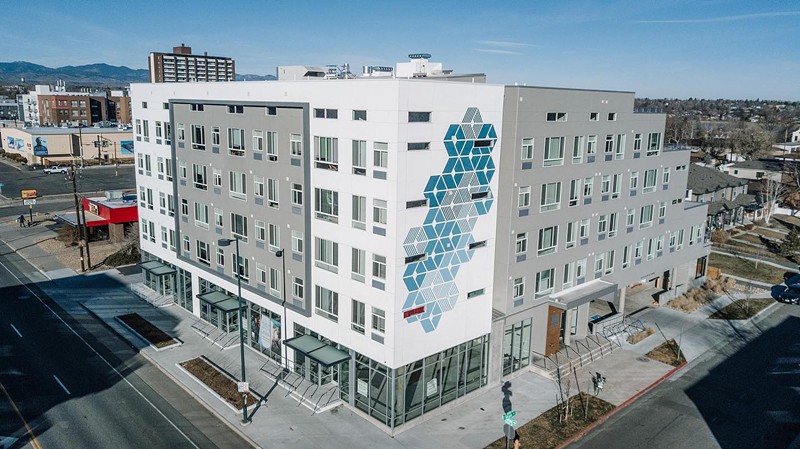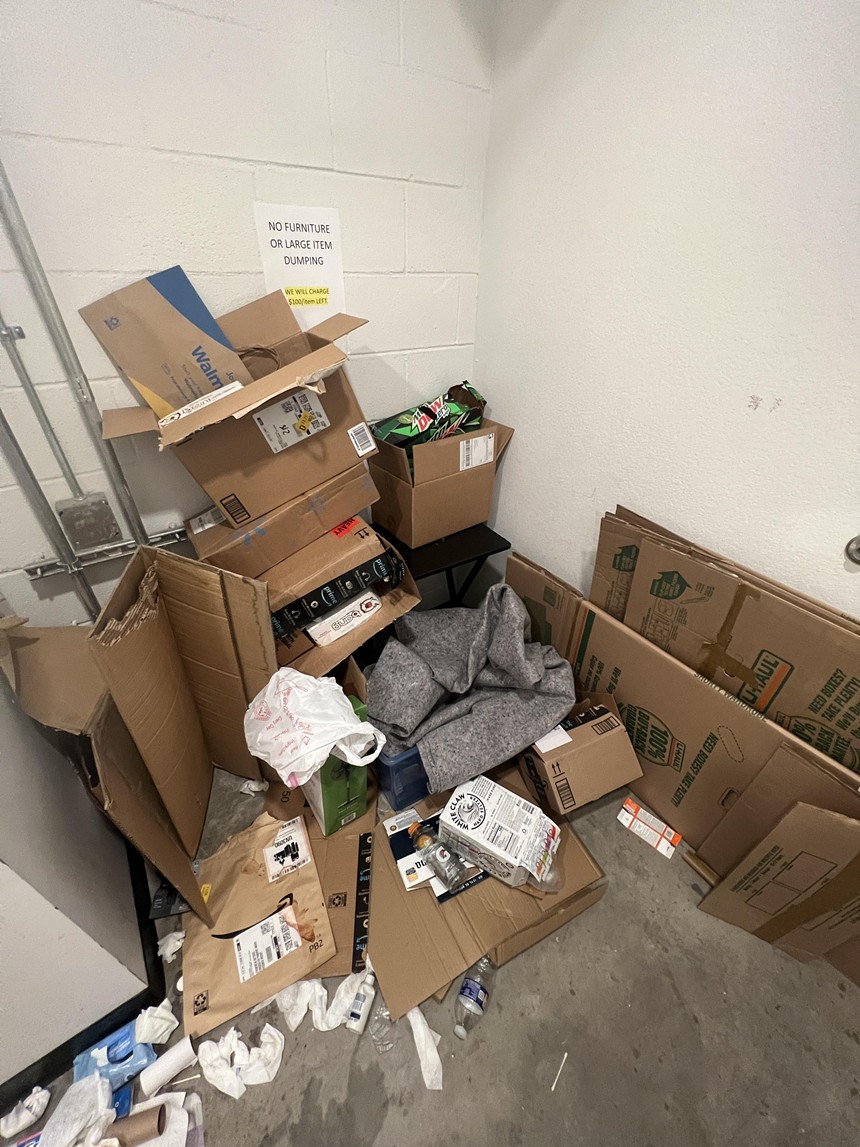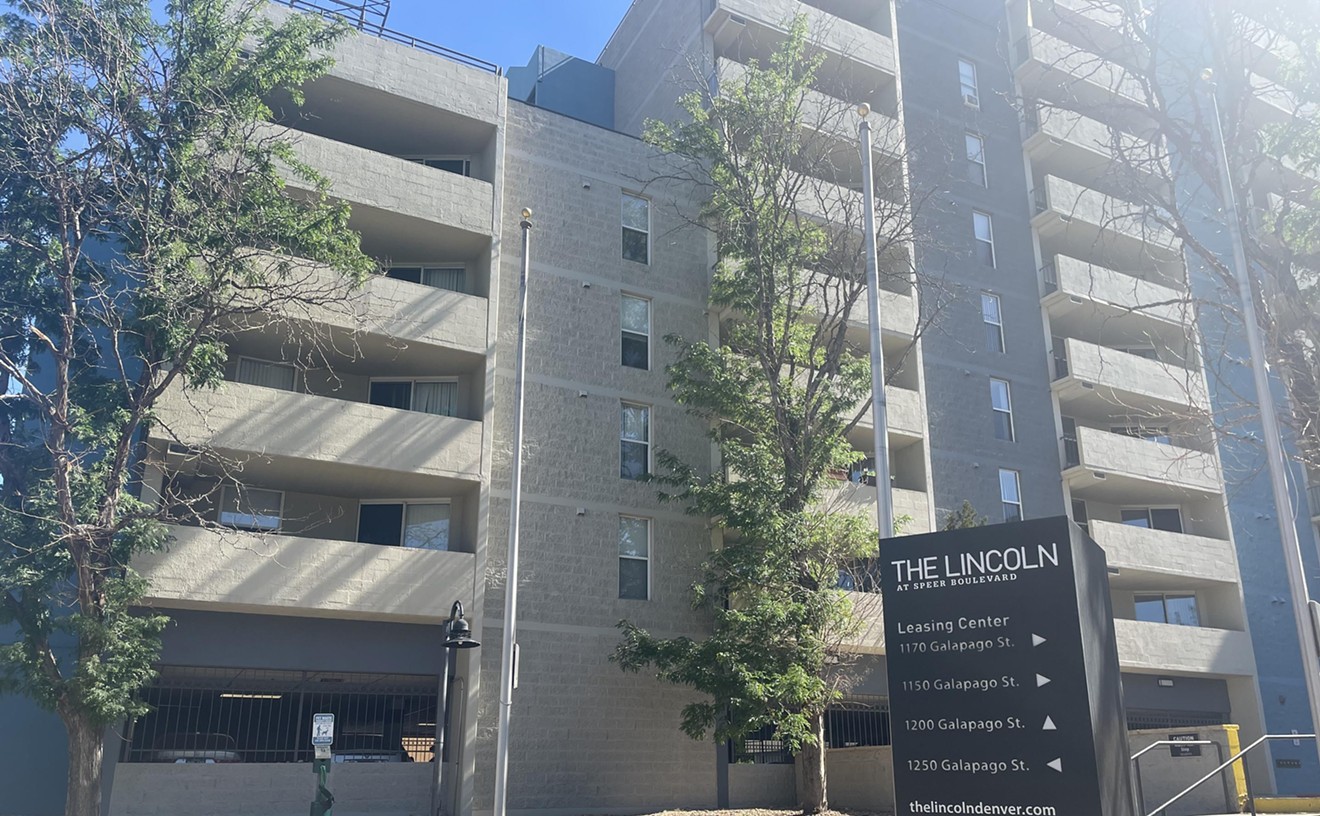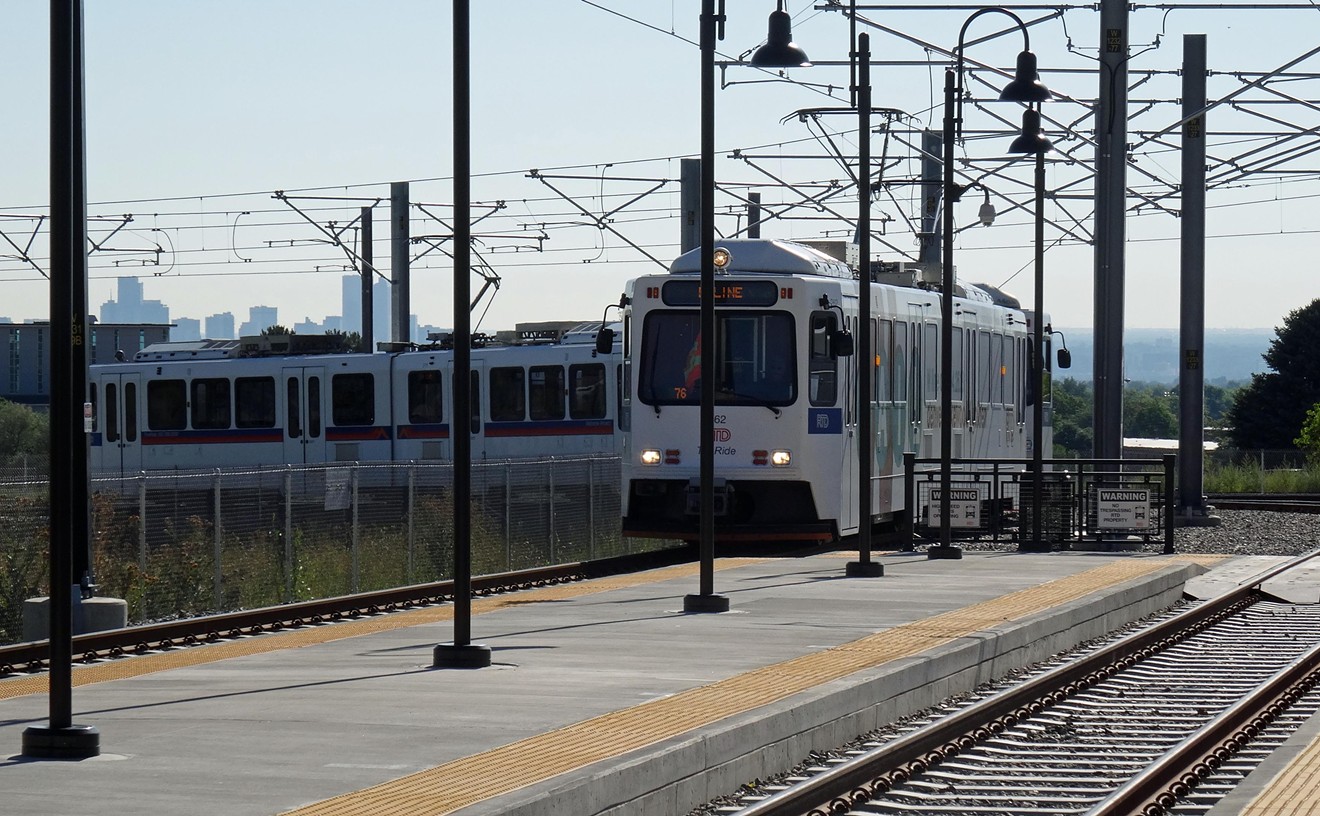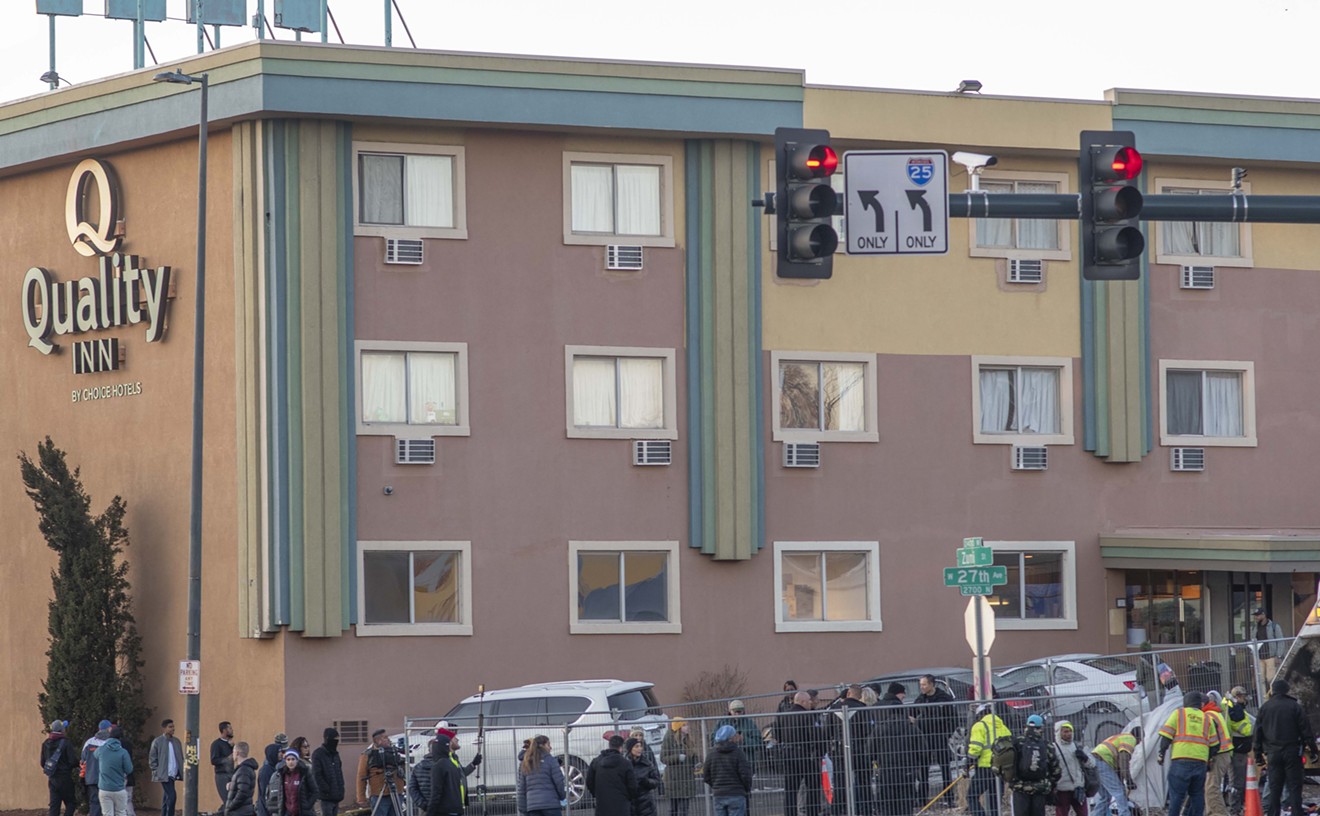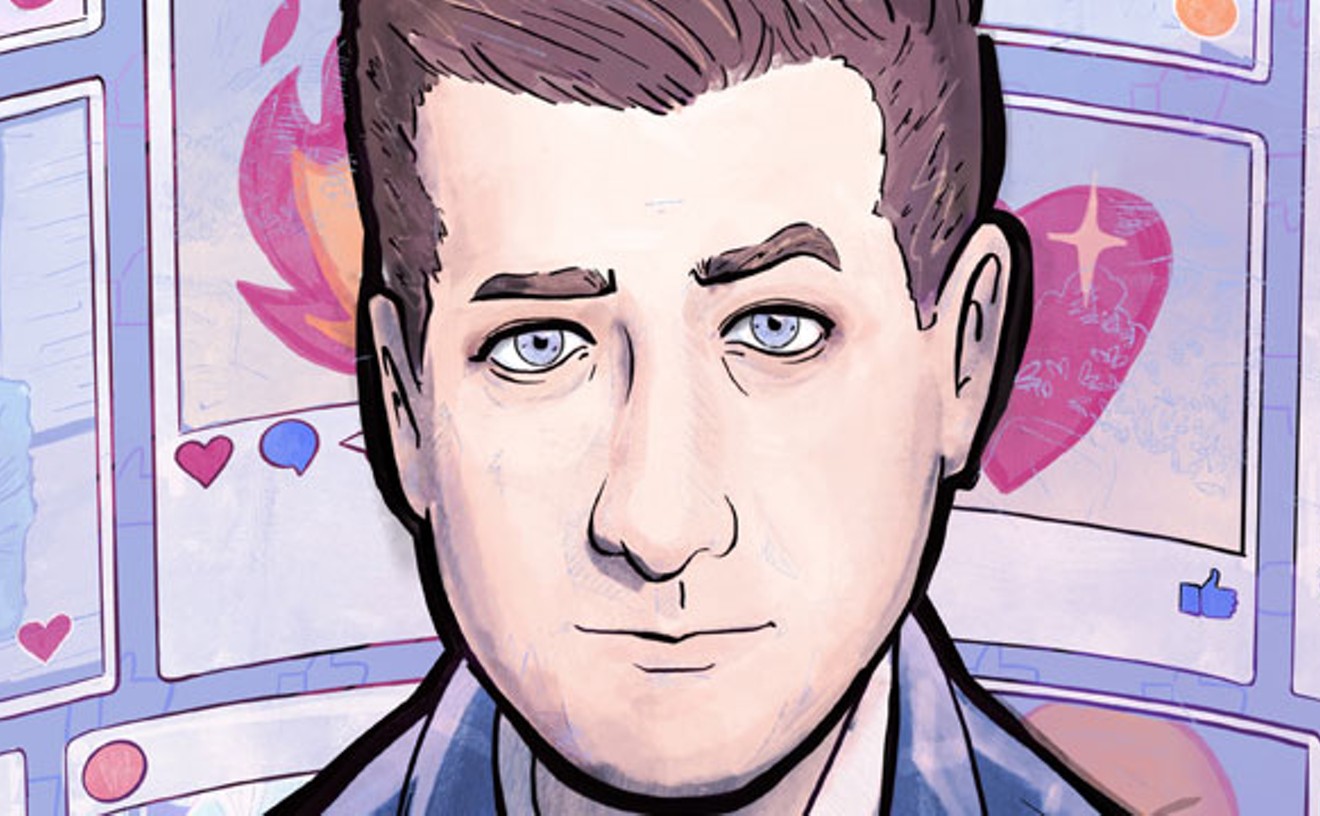On August 25, the Side Pony Coffee & Cocktail Lounge was hosting a party when the power suddenly went out.
Located at 4635 West Colfax Avenue near Sloan's Lake, the cafe and bar — along with its sister businesses, the fitness studio Duality and IV lounge/med spa Original Glam — sits on the ground floor of the 1515 Flats apartments located at 1515 Vrain Street.
Business owners Angela Neri and Jennifer Sevcik quickly realized during the party that Friday night that this wasn’t just an outage in one retail space; it was building-wide. When they contacted the property's management firm, Cardinal Group Companies, the response wasn’t what they expected.
“We were essentially told from them, ‘Here's the electrician service we've used in the past, give them a call,’” Sevcik recalls to Westword. “I clarified that this was a main breaker issue for the entire complex, not just my businesses, so it really wasn't my responsibility to do this.”
With hundreds of thousands of dollars in products at risk between their three businesses, Sevcik estimates that she and Neri called at least forty electricians that night before finding someone who could come out. By 3 a.m., they had found one who was able to walk them through recharging the breaker and temporarily restoring power, but a more permanent fix was needed.
For several days, residents of the 1515 Flats weren’t even notified about the power outage, says tenant Edward Nofe.
They were instead forced to get their updates from Sevcik on social media, which turned out to be far more informative than anything offered by Cardinal Group. “We couldn’t get inside because the elevators and front doors weren’t working,” Nofe says; the building is run on a key fob system, and the emergency maintenance line was down.
“When we found out on day two that the main breaker might be a month out from getting the part in, we basically felt like our businesses were crumbling before our eyes,” Sevcik explains. “There was really no end in sight on what the next step was. The landlords stayed in their little glass castle the entire time. They never once came on site.”
She and Neri called breaker manufacturers across the country to get the part they needed sooner. If they couldn’t, they knew their operations — especially Side Pony — wouldn’t make it. They did find one, and power was permanently restored on September 1 after a week of inconsistent and largely nonexistent electricity.
“Meanwhile I'm communicating with Cardinal Group,” Sevcik remembers. “Every minute on the minute, I'm sending them emails to my most senior contact saying your residents don't know what is going on. … There were blind residents that got locked out of the complex completely because one of the emergency generators failed, and we had to guide them back in."
It was sweltering that week, making it nearly impossible for residents to stay in their homes without electricity. Food was rotting away in their fridges; some, like Nofe, who work from home, were unable to do their jobs; many relocated to a hotel for the week on their own dime.
“People who had raised hell had gotten hotel vouchers,” Nofe says. “Some people paid out of pocket.”
Both commercial and retail tenants report communication being largely one-sided, with them asking questions and Cardinal Group being extremely slow to answer, if it responded at all. “This was the worst experience that I've ever had in dealing with people that are supposed to look out for you,” Sevcik blasts. “Rule number one of crisis management is communication, and they colossally failed in every single way.”
According to Cardinal Group, that's not what happened at all.
“This was an unprecedented and catastrophic failure of our building’s power system, and we worked as quickly as possible to restore power to the building,” it says in a statement to Westword, noting that it considers the outage to have started on August 27, when Sevcik and Neri's temporary fix wore off.
The company claims it worked “diligently and urgently” to repair the electrical system, installing generators and temporarily restoring power on August 30 before the permanent fix was made two days later.
“We recognize that our residents were inconvenienced, and it was a difficult position for our tenants to be in,” Cardinal Group adds. “We offered all tenants and residents rental concessions for their inconvenience. We also updated residents and tenants regularly throughout the process."
When people returned to their homes, they found that individuals had snuck into the parking garage to squat while the area was left unpopulated. “We returned to human feces on the floor,” Nofe says. And that wasn’t the worst of it: Trash collection hadn’t happened the week before, and many tenants were forced to throw away freezers and refrigerators full of rotten food.
“One hundred residents and three businesses have spoiled food that had gone into the trash chutes and piled up into the resident hallways,” Sevcik says. “It was absolutely filthy. … When we opened up for business operations on Tuesday, our entire businesses were covered in maggots and rats and urine and anything that loves trash.”
Since they couldn’t open a medical spa or restaurant in those conditions, Neri and Sevcik were stuck once again waiting on management to fix the problem. Sevcik says it took a week to fully fumigate the business and clean everything to a standard high enough for food service.
“We called the health department on ourselves twice because we didn't know what to do,” she tells Westword.
The Denver Department of Public Health and Environment confirms that it received several complaints related to the 1515 Flats. The ones for the power outages are now closed out, but another for trash and one for mold in the property's residential area are still being investigated.
For their troubles, residents were given the equivalent of one week’s rent abatement. “The feeling is that abatement is not enough to cover the losses,” Nofe charges, noting how residents who didn’t get hotel vouchers lost more than a week’s worth of rent, and replacing groceries is another cost entirely.
Additionally, residents didn’t get an option of whether to accept the abatements. They believe Cardinal Group is just using the payments as a way to say the company took care of the problem.
According to tenants, Cardinal Group won’t waive the fee for breaking a lease for people who wish to move out early because of the ongoing mess. “They say they aren’t breaching the Warrant of Habitability because they responded within 96 hours,” Nofe says. “They also say the rent abatement resolves their culpability.”
Colorado's Warranty of Habitability law specifies that landlords must start fixing problems within certain time limits, but it doesn't say anything about finishing. “Landlords must respond within 24 hours with a plan to fix the problem,” according to a guide put together by the Denver Regional Accountable Health Community Housing Workgroup. “If the issue is an emergency, a landlord has 24 hours to start fixing the problem. If the problem relates to a nonemergency repair, a landlord has 96 hours to start fixing the problem.”
Many residents have chosen to pay the fees to break their lease anyway, and those who are staying have been leaving detailed Google reviews about their experiences in the hope that others won't go in unaware like they did.
“This place has absolutely no right to use the word luxury to describe itself,” says a review from Nofe. “I’m at the mercy of my lease since they do not want to waive early move-out fees so I can get the hell out of this slum. … Perhaps there are other apartments just as bad as this place but that doesn’t mean you have to give this place in particular your money.”
Tenants have talked about forming a union or working together in some sort of way to get accountability. In the course of the discussions, it was discovered that Cardinal Group is the subject of a class-action lawsuit over its poor management at Denver’s Mint Urban Infinity apartments. Residents managed to connect with the lead plaintiff from that case to ask him how to better advocate for themselves.
They’ve also spoken with State Senator Julie Gonzales, House District 4 Representative Tim Hernandez and Denver City Council member Serena Gonzales-Gutierrez about the poor state of rental protections in Colorado and the Mile High City.
“We’re just trying to get our story out to the larger public and hopefully help keep Cardinal Group accountable — not just with our property, but with the other residences they manage as well,” Nofe says.
Gonzales tells Westword she's grateful to the 1515 Flats residents for reaching out.
“I couldn't be prouder of them,” she says. “It's a double-edged sword, because I wish that I didn't get these calls in the first place, but when I do get this type of outreach from my constituents, I'm always grateful that I do. I am quite concerned about our laws.”
The fact that there wasn’t an immediate remedy required in the statute worries Gonzales, and she sees space to strengthen the state’s Warrant of Habitability law. “What I heard very clearly from those tenants, based on their experience in navigating several days with no power and little, if any, communication from their management company, was that these tenants are asking us as lawmakers to hold predatory management companies to account,” she explains.
Gonzales is still working on exactly what that might look like, but she intends to address it legislatively in the 2024 session. In the meantime, she encourages those with similar experiences to reach out so she can be sure legislation addresses what’s happening on the ground.
In the case of commercial businesses, there isn’t a Warrant of Habitability law to protect them. Sevcik says the leases signed by Duality, Original Glam and Side Pony are heavily slanted toward Cardinal Group, which she and Neri only realized once they looked to them for recourse.
“Unfortunately for just regular ol' Joes trying to open a business and be good contributors to the area, it feels like we get taken advantage of because they know that we're not going to have as much knowledge, and that's really sad,” Sevcik tells Westword.
According to her, Cardinal Group was just as unsympathetic to the losses at Duality, Original Glam and Side Pony as it was to residents. She says the firm even told her “that if I talked to the news, that [it] would halt the recovery efforts of the power restoration.”
Sevcik is ready to speak out now because Cardinal Group allegedly failed to uphold its end of the deal yet again.
She says the company originally claimed it would take care of the losses the three businesses had experienced, but when she sent them documentation of over $100,000 being owed, it changed its tune.
Instead of covering everything, it offered the one-month rent abatement for each business, which Sevcik estimates is worth only about 10 percent of the losses. “What we had to do in return for that was drop the claim entirely and all of our accusations of their negligence and their extortion and whatnot,” Sevcik says. “So we declined the offer. We paid our rent. Side Pony is hanging on by a negative thread right now.”
Duality and Original Glam will be all right, according to Sevcik, but the businesses are all just seven months into a series of seven-year leases, respectively. After everything happened, Cardinal Group began treading carefully and being more responsive. If it keeps doing so, that would be a good outcome, Sevcik says, but it still might not save Side Pony.
Going seven days without being open may not seem like much, but for a small business in the coffee and cocktail industry — especially one that kept paying its employees throughout the closure — it can be a death sentence.
"We're asking the community to come and support us," Sevcik says. "To come grab a coffee, grab a cocktail, book an event, have a meeting over with us and just see if we can get ourselves back on our feet.”
[
{
"name": "Air - MediumRectangle - Inline Content - Mobile Display Size",
"component": "12017618",
"insertPoint": "2",
"requiredCountToDisplay": "2"
},{
"name": "Editor Picks",
"component": "17242653",
"insertPoint": "4",
"requiredCountToDisplay": "1"
},{
"name": "Inline Links",
"component": "18838239",
"insertPoint": "8th",
"startingPoint": 8,
"requiredCountToDisplay": "7",
"maxInsertions": 25
},{
"name": "Air - MediumRectangle - Combo - Inline Content",
"component": "17261320",
"insertPoint": "8th",
"startingPoint": 8,
"requiredCountToDisplay": "7",
"maxInsertions": 25
},{
"name": "Inline Links",
"component": "18838239",
"insertPoint": "8th",
"startingPoint": 12,
"requiredCountToDisplay": "11",
"maxInsertions": 25
},{
"name": "Air - Leaderboard Tower - Combo - Inline Content",
"component": "17261321",
"insertPoint": "8th",
"startingPoint": 12,
"requiredCountToDisplay": "11",
"maxInsertions": 25
}
]

